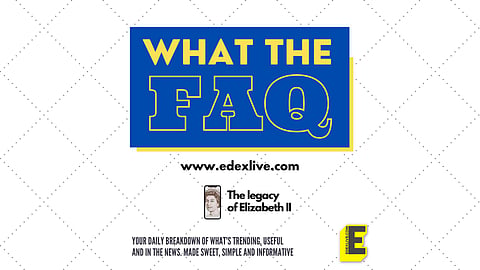

Queen Elizabeth II died at her estate in Balmoral, Scotland on the afternoon of September 8, according to a statement from Buckingham Palace. She became the UK's longest-serving monarch in 2015, when she overtook her great-great-grandmother Queen Victoria’s record of the same, who had ruled from 1837 to 1901. Her 70 years on the throne were filled with both achievements and criticisms as well.
In today’s FAQ, we will look at all of this a little closely.
When did the Queen come to power? What were some of her achievements?
Queen Elizabeth ascended the throne in 1952 at the age of 25, after the death of her father King George VI. By the time she came to power, the British empire was witnessing a decline following World War II and it was upon her to steady the establishment of the Commonwealth, according to reports. When she was crowned, the Commonwealth had eight member states but today there are 54.
During her reign, she transformed the long-standing tradition of royalty that favoured the succession of male heirs over females to the English crown. She was also the first British monarch to address a joint meeting of the United States Congress on May 16, 1991, after the US won independence from the British empire. The Queen was also known for her charity work as she supported more than 600 charities in Britain, according to reports.
What criticism were made against the monarch?
Despite the never-ending list of achievements, the Queen was criticised on a few occasions, especially with regard to other members of the royal family. When Diana, Princess of Wales, was killed in a car crash, people criticised her for staying silent for days together. In fact, in 1992, the public questioned whether “misbehaving royals” were deserving of their tax-free status and taxpayer-funded lifestyle, as some reports pointed out.
She was also seen in a bad light after Prince Andrew’s friendship with the accused sex trafficker Jeffrey Epstein came to the fore. However, the Queen was also known to stay quiet with respect to making statements on political issues and avoided the dreaded path of making controversial remarks in public.
What was the Queen’s relationship with the media, including pop culture?
Although the coronation of Queen Elizabeth II in 1953 was touted to be a sight to behold on British TV, media references of the Queen and the royal family thereafter, have given the public a peek into their private lives. This was mainly due to the rapid evolution of media during her time and the growing interest in the lives of high-profile people.
For example, the famous “fictionalised” TV show on Netflix The Crown depicted the Queen’s reign up to the 1980s. Not just this, the 1969 BBC documentary The Royal Family, attracted millions of viewers across Britain. Even before she took over the throne, she would use mediums such as the radio, wherein, in her first radio address in 1940, she spoke to other children who had been separated from their families during World War II to keep them safe, reports pointed out.
What is Operation Unicorn that has been activated after the Queen’s death?
The term “Operation Unicorn” was given to the UK's plan post the death of the Queen. Buckingham Palace already had a plan set in motion for the Queen’s funeral that was reportedly codenamed “London Bridge” had she died in London, reports said.
However, the palace decided to name the operation after Scotland's national animal — Unicorn — if the monarch died in Scotland, which she did. Certain special provisions such as the National Flag at Downing Street being lowered to half-mast, BBC anchors dressed in black and channels switching to rolling news — are part of the operation.
Who is next in line?
The throne has now passed on to Charles, the former Prince of Wales, and he will be known as King Charles III. Reports suggest that he will be proclaimed King on Saturday, September 10 in front of a ceremonial body that is known as the Accession Council.
